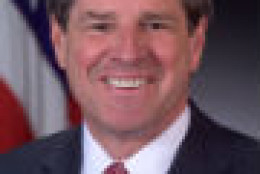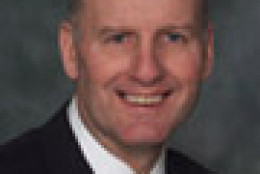Congress
-
The Senate Homeland Security and Governmental Affairs Committee members will introduce and markup the Federal Information Security Modernization Act of 2014 Wednesday. The bill would require OMB to rescind a major section of Circular A-130 in order to fix long-standing complaints with FISMA's reauthorization requirements.
June 24, 2014 -
Your agency's funding bill may be among the spending vehicles that appear to be stalling out in Congress. The Senate's effort to get several bills through in a package has hit a roadblock. David Hawkings is Senior Editor at Roll Call and host of the Hawkings Here blog. He detailed the stops-and-starts of the agency budget process on In Depth with Francis Rose.
June 23, 2014 -
The House of Representatives passed a bill that would cut more than $300 million from last year's Internal Revenue Service budget. This adds to the tension between Congress and the IRS over lost emails.
June 23, 2014 -
Despite reports of delayed patient treatments, falsified records and preventable veteran deaths, the Department of Veterans Affairs said all of its 470 senior executives have been rated "successful" over the past four fiscal years. The ratings have sparked outrage among members of the House Committee on Veterans Affairs, whose chairman called the performance rating and bonus system at the VA "outlandish."
June 20, 2014 -
Maybe the United States was never really finished in Iraq. Regardless, events of the past two weeks have returned that nation to a front and center position for Congress and the administration. Paul Bremer was U.S. Presidential envoy to Iraq in 2003 and 2004. A career diplomat, he was thrust into the spotlight as temporary head of the Iraqi government after the fall of Saddam Hussein. Most of the questions this week have been about military options now that the government is under threat. Bremer joined Tom Temin and Emily Kopp on the Federal Drive to discuss how this situation affects the State Department both here and in Baghdad.
June 20, 2014 -
Last week, the Senate voted overwhelmingly to approve legislation designed to help solve long wait times at VA medical facilities. The longer-term fixes included more funding to hire health care providers and lease more VA operated facilities. For the shorter term, the McCain-Sanders bill also expands VA's authority to send its patients to outside providers -- including private clinics, but also facilities run by other agencies, including the Indian Health Service and the Defense Department. Retired Vice Adm. Norb Ryan is the president of the Military Officer's Association of America. He spoke with Jared Serbu on In Depth about the plusses -- and as MOAA sees it -- some of the minuses of the bill.
June 18, 2014 -
Federal Chief Information Officer Steve VanRoekel says good management policies should be enough to improve how agencies buy, operate and deliver technology.
June 17, 2014 -
The mid-term elections are upon us, and some people are complaining about political fatigue and gridlock. But for federal and postal workers — and retirees — these may be the good old days, Senior Correspondent Mike Causey says.
June 17, 2014 -
With an employment drop over the past year, agencies must adopt a "less with less" mentality, according Bob Tobias, director of Key Executive Leadership Programs at American University. He says executives must be honest with Congress about their limited capabilities.
June 16, 2014 -
Both chambers of Congress are back at work. One of the focal points of concentration this week will be agency appropriations bills. David Hawkings is Senior Editor at Roll Call. He told Francis Rose on In Depth the pressure to make progress on spending bills is coming from the calendar.
June 16, 2014 -
"Inside the DoD's Reporter's Notebook" is a biweekly feature focused on news about the Defense Department and defense community as gathered by Federal News Radio DoD Reporter Jared Serbu. In this edition, DoD kicks off its "superior supplier" program, and DoD asks Congress to stop pushing acquisition reforms.
June 16, 2014 -
The House and Senate have both passed bills to shore up the Veterans Affairs Department. Now they are in conference to reconcile. The final bill would give veterans more opportunities to seek care outside of VA hospitals, while beefing up the VA's own medical staff. The Congressional Budget Office has scored the VA bill and estimates the expense of the additional care would be about $50 billion. Yevgeniy Feyman, fellow at the Manhattan Institute, joined Tom Temin and Emily Kopp on the Federal Drive to discuss whether all the money will help.
June 13, 2014 -
Does an upset in a political primary in Richmond, Virginia, mean permanent political gridlock in Washington? According to some pros, everything changed last Tuesday, Senior Correspondent Mike Causey says.
June 13, 2014 -
After six years, the Department of Homeland Security decided in April to abandon its strategy to upgrade biological weapon detection equipment in large U.S. cities. But there is no backup plan so far, and the current system won't last much longer. To date, DHS says it has actually expended only $61 million on Biowatch 3, and officials told the House Homeland Security Committee on Tuesday that they are moving quickly to come up with a new acquisition plan.
June 11, 2014 -
Leaders of both the House and Senate pledge to move quickly on legislation to help the Veterans Affairs Department treat the more than 100,000 vets who are either waiting months for medical appointments or have been unable to see a doctor. At a House hearing late last night, a top VA official apologized for the delays, calling them indefensible. Martin Matishak, staff writer at The Hill, joined Emily Kopp on the Federal Drive to discuss prospects for legislation and VA's future.
June 10, 2014







